Chapter 1 Constitution - Why and How?
- BoardCBSE
- TextbookNCERT
- ClassClass 11
- SubjectCivics
- ChapterChapter 1 Constitution - Why and How?
- Chapter NameChapter 1 Constitution: Why and How?
- CategoryNCERT Solutions
NCERT Solutions for Class 11 Political Science Chapter 1 Constitution: Why and How? is a crucial resource for students studying the political science curriculum in class 11. This chapter delves into the fundamental aspects of the Indian Constitution, exploring the reasons behind its creation and the process of its formulation.
The introduction to this chapter provides a comprehensive overview of the key topics covered, including the historical context, the need for a constitution, and the various stages involved in its drafting. This information is presented in a clear and concise manner, making it accessible to students of all levels.
By understanding the why and how of the Indian Constitution, students can gain a deeper appreciation for the principles and values that underpin our democratic system. This knowledge is essential NCERT Solutions for class 11 political science students as they navigate the complexities of the subject, including the class 11 political science chapter 1 constitution why and how, class 11 political science chapter 1 MCQ, and important questions and answers for class 11 political science chapter 1.
Class 11 Political Science Chapter 1 Questions with Answers
Class 11 Political Science Chapter 1 Questions with Answers is a comprehensive resource that provides detailed solutions to the questions and MCQs from the first chapter of the class 11 political science curriculum. This resource covers class 11 political science chapter 1 important questions answers, helping students deepen their understanding of the subject matter.
Ques: What is a constitution?
Ans: A constitution is a set of fundamental principles or established precedents according to which a state or other organization is governed. It defines the structure, procedures, powers, and duties of government institutions and sets out fundamental rights of citizens.
Ques: Why is a constitution necessary?
Ans: A constitution is necessary to provide a framework for the governance of a country, ensure the protection of citizens rights, maintain law and order, and establish the distribution of power among different institutions of the state.
Ques: How does the constitution reflect the aspirations of society?
Ans: The constitution reflects the aspirations of society by incorporating the values, ideals, and goals of the people. It embodies the collective vision for justice, liberty, equality, and fraternity.
Ques: What is the significance of the Preamble in the Indian Constitution?
Ans: The Preamble of the Indian Constitution outlines the objectives and guiding principles of the Constitution. It declares India to be a sovereign, socialist, secular, and democratic republic, and promises justice, liberty, equality, and fraternity to its citizens.
Ques: How was the Constituent Assembly of India formed?
Ans: The Constituent Assembly of India was formed in 1946 under the Cabinet Mission Plan. It consisted of representatives elected by the provincial legislatures and nominated by the princely states.
Ques: Who was the chairman of the Drafting Committee of the Indian Constitution?
Ans: Dr. B.R. Ambedkar was the chairman of the Drafting Committee of the Indian Constitution.
Ques-What is the role of the constitution in a democratic country?
Ans: In a democratic country, the constitution serves as the supreme law, ensuring the rule of law, protecting individual rights, limiting the powers of the government, and providing a system of checks and balances.
Ques: What are fundamental rights?
Ans: Fundamental rights are the basic human rights guaranteed by the constitution to all citizens. These rights include the right to equality, freedom, religion, cultural and educational rights, and the right to constitutional remedies.
Ques-How does the Indian Constitution ensure social justice?
Ans: The Indian Constitution ensures social justice through various provisions like the abolition of untouchability, prohibition of discrimination, reservation of seats for scheduled castes and tribes, and promoting the welfare of backward classes.
Ques-What is the significance of the Directive Principles of State Policy?
Ans- The Directive Principles of State Policy are guidelines for the framing of laws by the government. They aim to create social and economic conditions under which citizens can lead a good life and ensure that the state works towards welfare objectives.
Ques-What is the importance of the separation of powers in a constitution?
Ans- The separation of powers is crucial to prevent the concentration of power in one branch of government. It divides the responsibilities among the legislative, executive, and judicial branches to provide a system of checks and balances.
Ques-How can the Constitution be amended?
Ans- The Indian Constitution can be amended through Article 368, which allows for changes to be made by the Parliament. Some amendments require a simple majority, while others need a two-thirds majority and ratification by at least half of the state legislatures.
Ques-What is judicial review?
Ans: Judicial review is the power of the judiciary to examine the constitutionality of legislative acts and executive orders. It ensures that laws and actions do not violate the Constitution.
Ques-Why is the independence of the judiciary important?
Ans:-The independence of the judiciary is vital to ensure fair and impartial administration of justice. It protects judges from external pressures and allows them to make decisions based solely on the law and facts.
Ques-What are the basic features of the Indian Constitution?
Ans- The basic features of the Indian Constitution include federalism, parliamentary system, fundamental rights, directive principles, secularism, judicial independence, and the rule of law.
Ques-What is the significance of the federal structure in the Indian Constitution?
Ans- The federal structure divides power between the central government and the state governments, allowing for regional autonomy while maintaining national unity. It helps manage the diversity of the country by addressing local needs and issues.
Ques- -How does the Constitution protect minority rights?
Ans: - The Constitution protects minority rights through provisions like cultural and educational rights, freedom of religion, and reservation of seats in legislatures and educational institutions to ensure their representation and preservation of their culture.
Ques: -What is the importance of the rule of law in a constitutional democracy?
Ans: - The rule of law ensures that all individuals and institutions are accountable to the same laws. It prevents arbitrary use of power, promotes fairness, and maintains order and stability in society.
Ques: - How does the Constitution of India address emergency situations?
Ans: - The Constitution of India has provisions for the declaration of emergencies (national, state, and financial) under Articles 352, 356, and 360. These provisions allow the central government to take necessary actions to protect the sovereignty, security, and financial stability of the country.
Class 11 Political Science Chapter 1 MCQs with Answers
Ques: What is the primary function of a constitution?
A) To define the official language of a country
B) To set out the fundamental principles and framework of government
C) To provide the history of the country
D) To list all the laws of the country
Ans: B) To set out the fundamental principles and framework of government
Explanation: The constitution establishes the structure, powers, and duties of government institutions and guarantees certain rights to citizens.
Ques: Who was the chairman of the Drafting Committee of the Indian Constitution?
A) Mahatma Gandhi
B) Jawaharlal Nehru
C) Dr. B.R. Ambedkar
D) Sardar Patel
Ans: C) Dr. B.R. Ambedkar
Explanation: Dr. B.R. Ambedkar was appointed as the chairman of the Drafting Committee, which was responsible for drafting the Constitution of India.
Ques: What does the Preamble of the Indian Constitution signify?
A) The history of India
B) The objectives and guiding principles of the Constitution
C) The amendments to the Constitution
D) The judicial system of India
Ans: B) The objectives and guiding principles of the Constitution
Explanation: The Preamble outlines the philosophy and objectives of the Constitution, declaring India to be a sovereign, socialist, secular, and democratic republic.
Ques: Which of the following is NOT a feature of the Indian Constitution?
A) Federalism
B) Parliamentary System
C) Presidential System
D) Secularism
Ans: C) Presidential System
Explanation: The Indian Constitution provides for a parliamentary system of government, not a presidential system.
Ques: What is the significance of Fundamental Rights in the Indian Constitution?
A) To protect the privileges of the elite
B) To ensure the centralization of power
C) To guarantee basic human rights to all citizens
D) To establish a monarchical system
Ans: C) To guarantee basic human rights to all citizens
Explanation: Fundamental Rights are essential for the development of individuals and protect citizens from any arbitrary actions of the state.
Ques: How can the Indian Constitution be amended?
A) Through a simple executive order
B) By a majority vote in the Supreme Court
C) By the Parliament, through a special procedure
D) Through a national referendum
Ans: C) By the Parliament, through a special procedure
Explanation: Amendments to the Constitution are made by the Parliament under Article 368, following a specific procedure.
Ques: What is the purpose of the Directive Principles of State Policy?
A) To enforce laws
B) To guide the state in policymaking and governance
C) To provide a judicial review
D) To allocate seats in Parliament
Ans: B) To guide the state in policymaking and governance
Explanation: The Directive Principles are guidelines for the creation of social and economic policies aimed at promoting social justice and welfare.
Ques: What does the term 'secular' mean in the context of the Indian Constitution?
A) State-sponsored religion
B) Equal treatment of all religions by the state
C) Absence of religion
D) Dominance of one religion
Ans: B) Equal treatment of all religions by the state
Explanation: Secularism in the Indian Constitution means that the state treats all religions equally and does not favor or discriminate against any religion.
Ques: Which part of the Constitution deals with Fundamental Rights?
A) Part I
B) Part II
C) Part III
D) Part IV
Ans: C) Part III
Explanation: Part III of the Indian Constitution deals with Fundamental Rights, guaranteeing essential freedoms and rights to all citizens.
Ques: What is meant by the term 'judicial review'?
A) Review of laws by the executive
B) Review of laws and actions by the judiciary to ensure they are constitutional
C) Review of parliamentary proceedings
D) Review of government policies by the public
Ans: B) Review of laws and actions by the judiciary to ensure they are constitutional
Explanation: Judicial review is the power of the judiciary to examine the constitutionality of legislative acts and executive orders, ensuring that they do not violate the Constitution.
| Chapter-Wise NCERT Solutions for Class 11 Political Science (Civics) | |
|---|---|
| Chapter 1 Constitution: Why and How? | Chapter 2 Rights and Duties in the Indian Constitution |
| Chapter 3 Election and Representation | Chapter 4 Executive |
| Chapter 5 Legislature | Chapter 6 Judiciary |
| Chapter 7 Federalism | Chapter 8 Local Governments |
| Chapter 9 Constitution as a Living Document | Chapter 10 The Philosophy of the Constitution |
Advantages of Solving Class 11 Political Science from Home-Tution.com
NCERT Textbook Solutions for Class 11 Political Science provided on this page are clear and easy to understand.
The language used in the NCERT Solutions for Class 11 Political Science is simple, helping students grasp the concepts quickly.
Students can access these solutions anytime, anywhere, without any difficulty.
All the questions are solved based on the NCERT (CBSE) Syllabus and Textbooks. Mastering these solutions will help students score well in their exams.
NCERT Solutions for Class 11 Political Science on this page are available free of cost.
We hope these NCERT Solutions for Class 11 Political Science will be helpful in your board exam preparation.
NCERT Solutions Political Science Class 11 Chapter 1 PDF Download - Constitution: Why and How?
Political Science Class 11 Chapter 1 PDF is a valuable resource for students studying the first chapter of the political science curriculum in class 11. This comprehensive document covers a wide range of topics related to the Indian Constitution, including the historical context, the need for a constitution, and the process of its formulation.
The PDF provides detailed explanations and answers to class 11 political science chapter 1 question answers, helping students deepen their understanding of the subject matter. It also includes class 11 political science chapter 1 MCQ, which allows students to test their knowledge and identify areas that require further study.
Additionally, the PDF features a section on important questions and answers for class 11 political science chapter 1, ensuring that students are well-prepared for examinations and assessments. This resource is an essential tool for students looking to excel in their political science studies at the class 11 level.
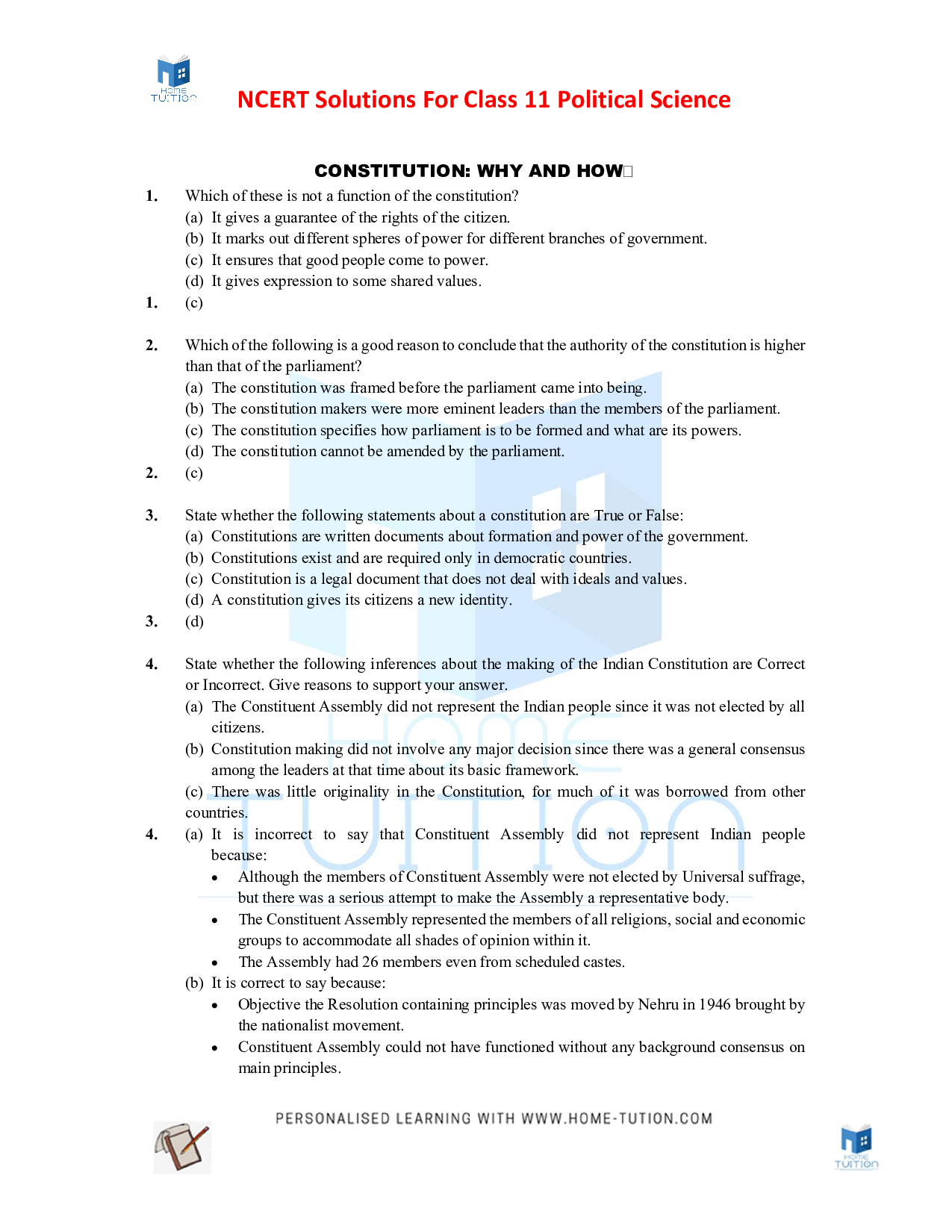
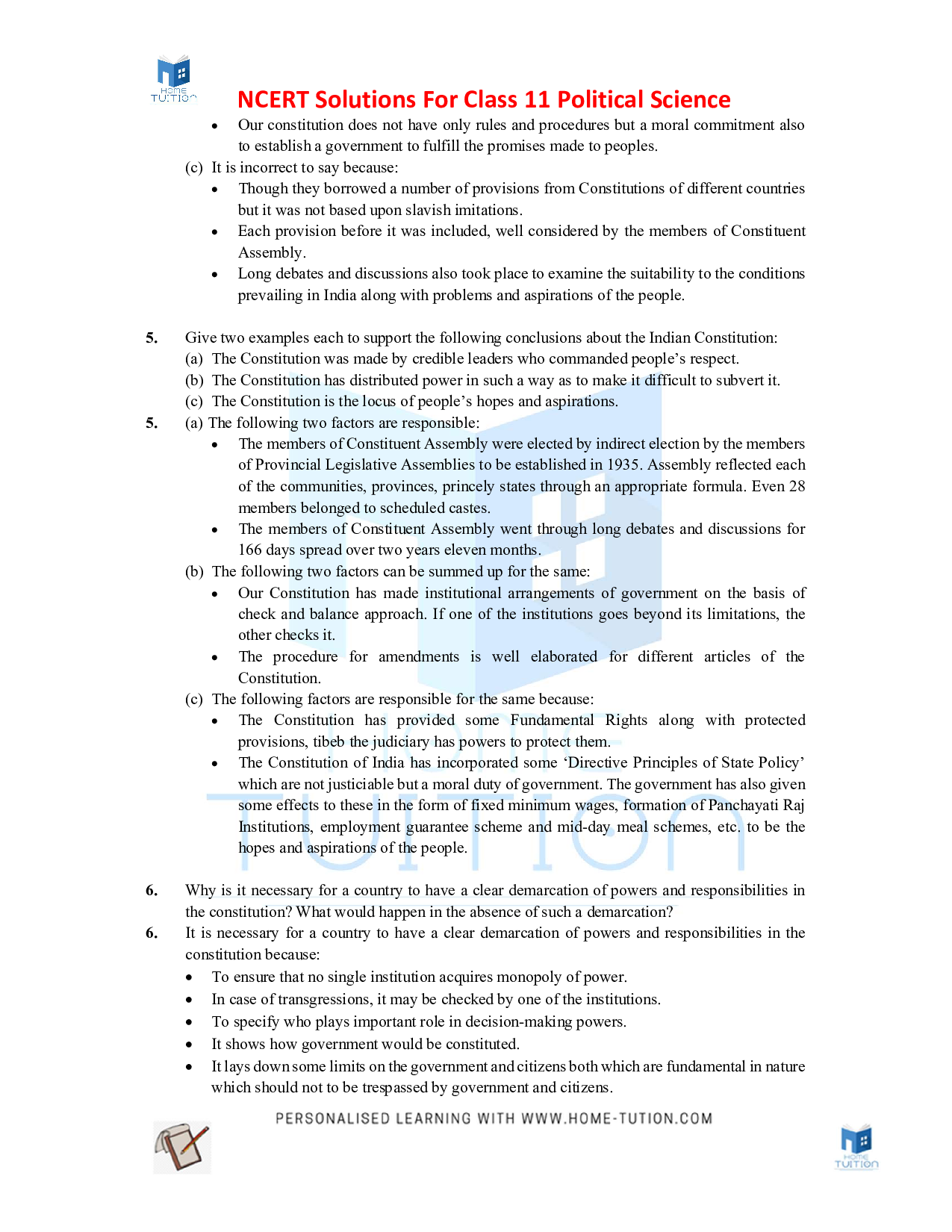
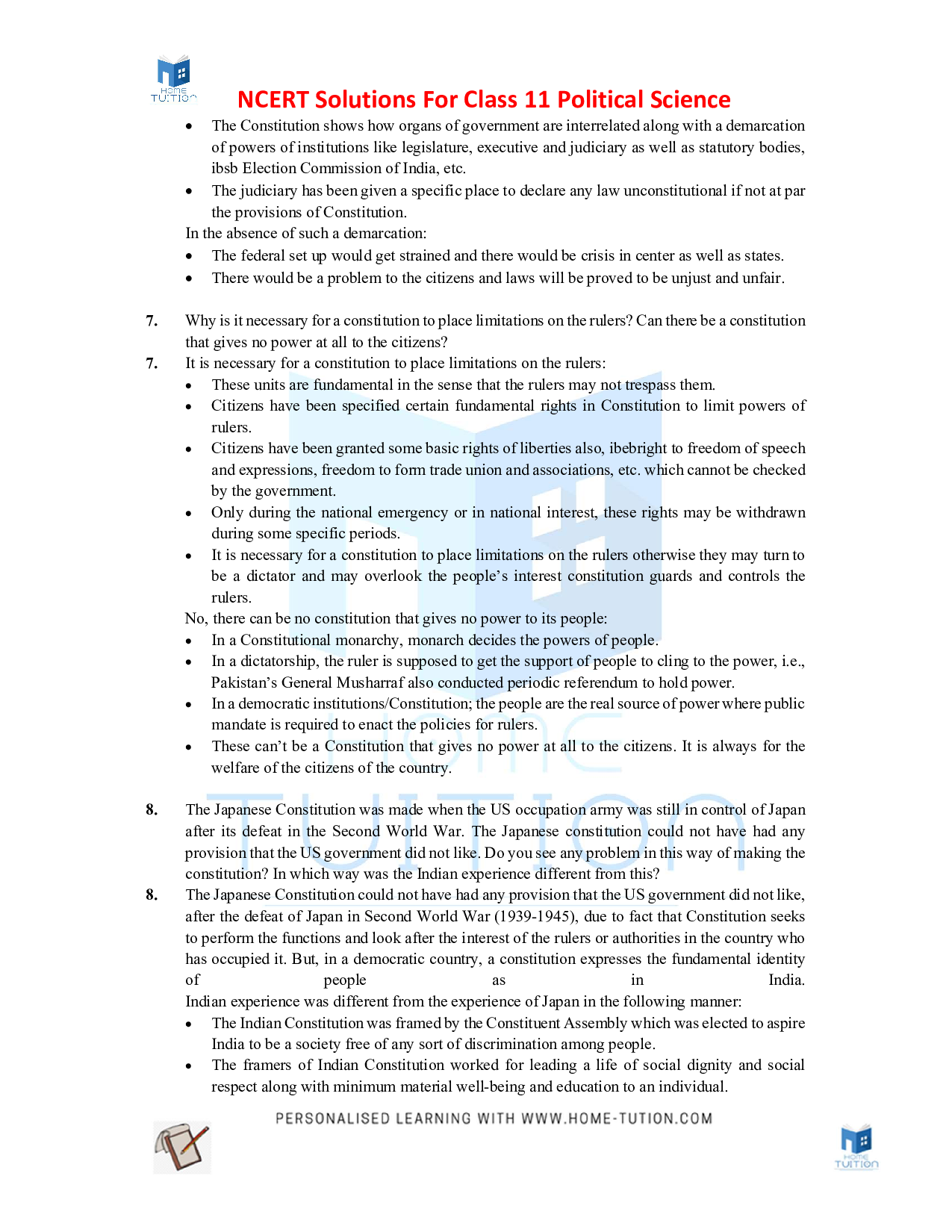
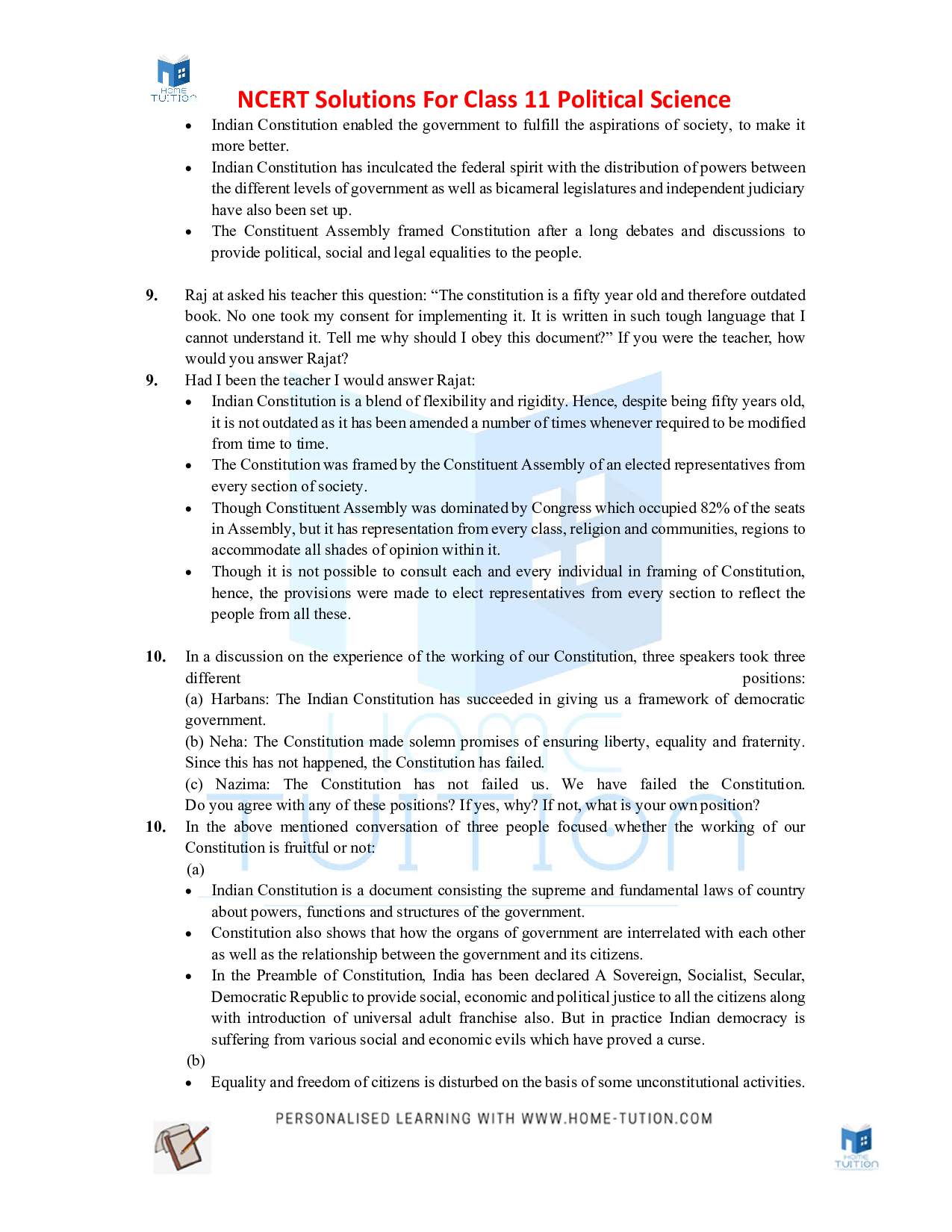
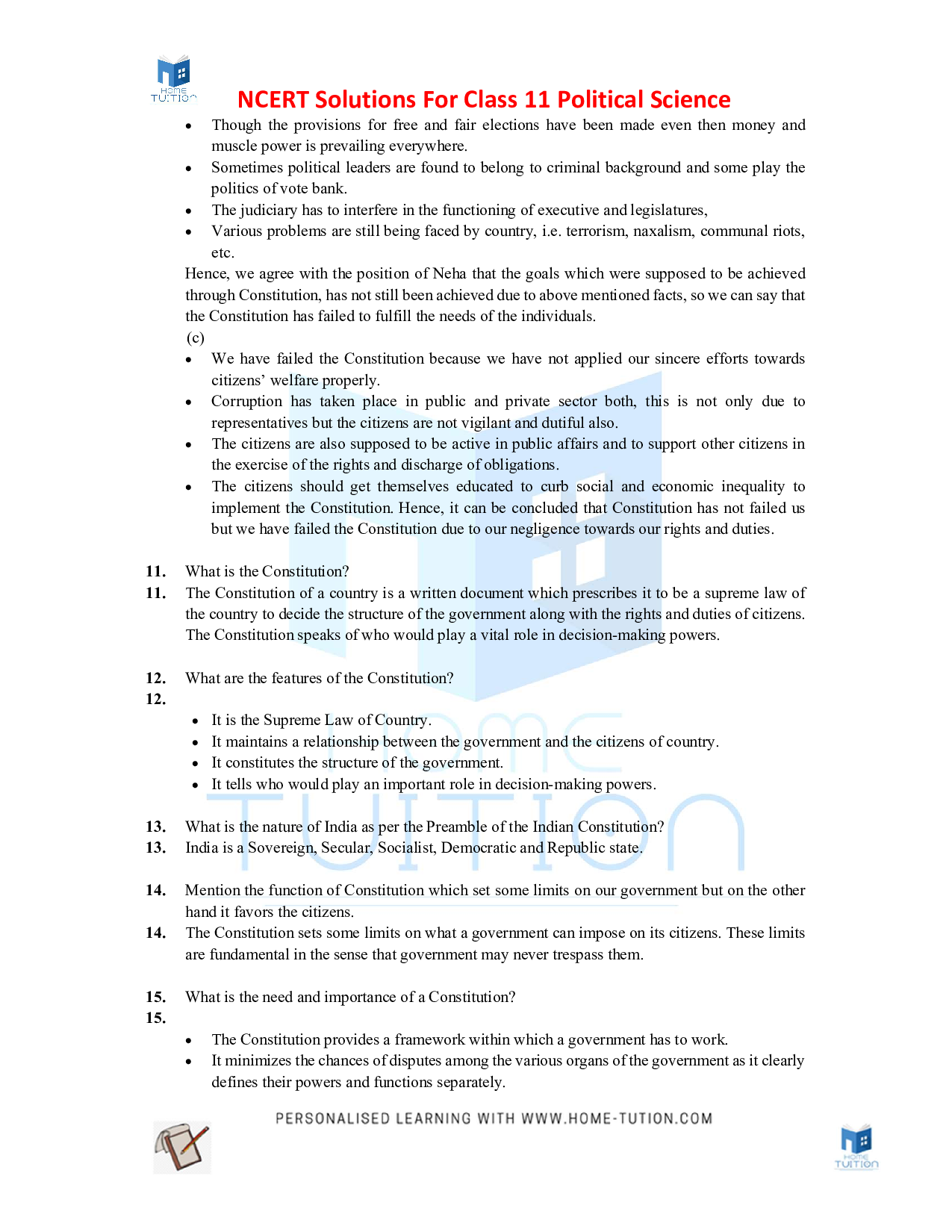
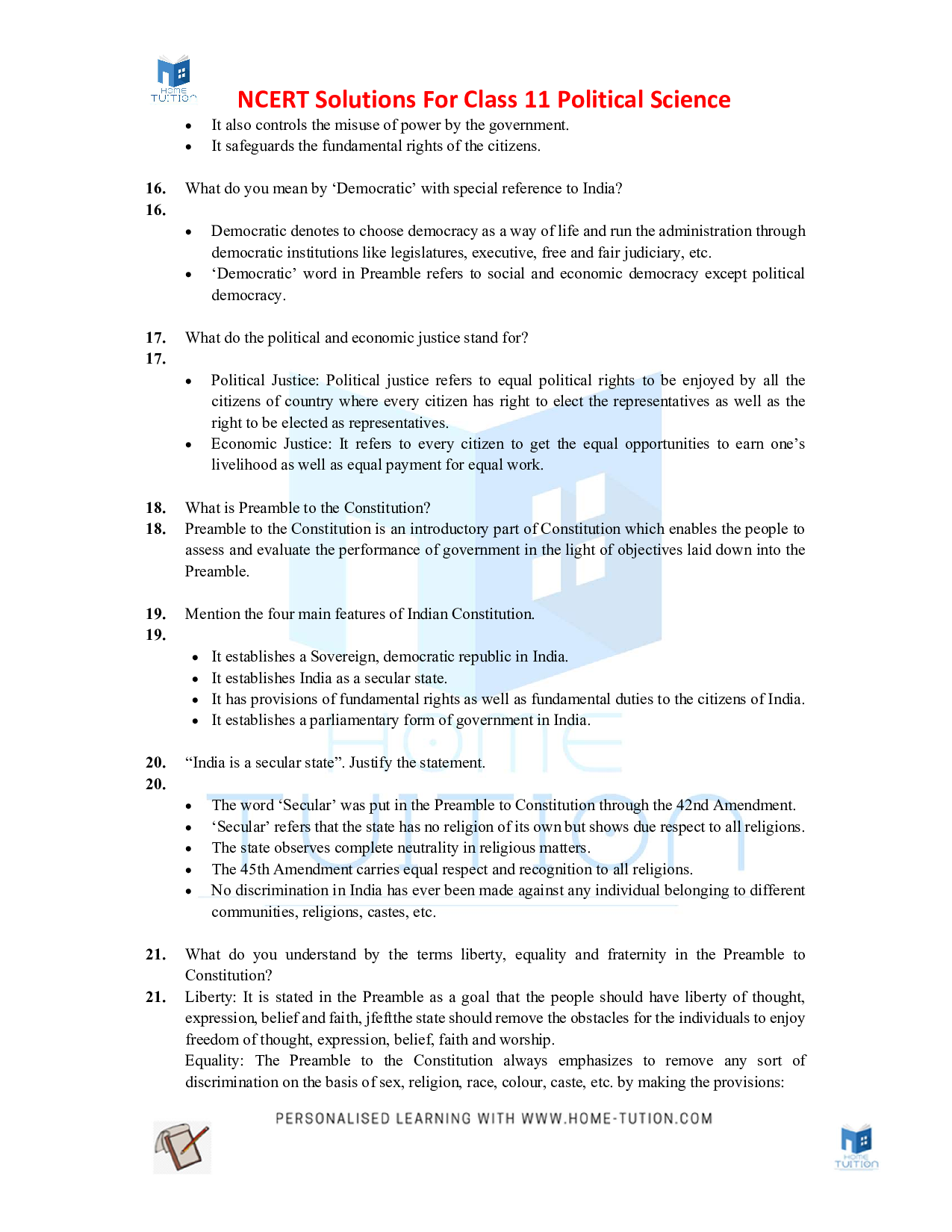
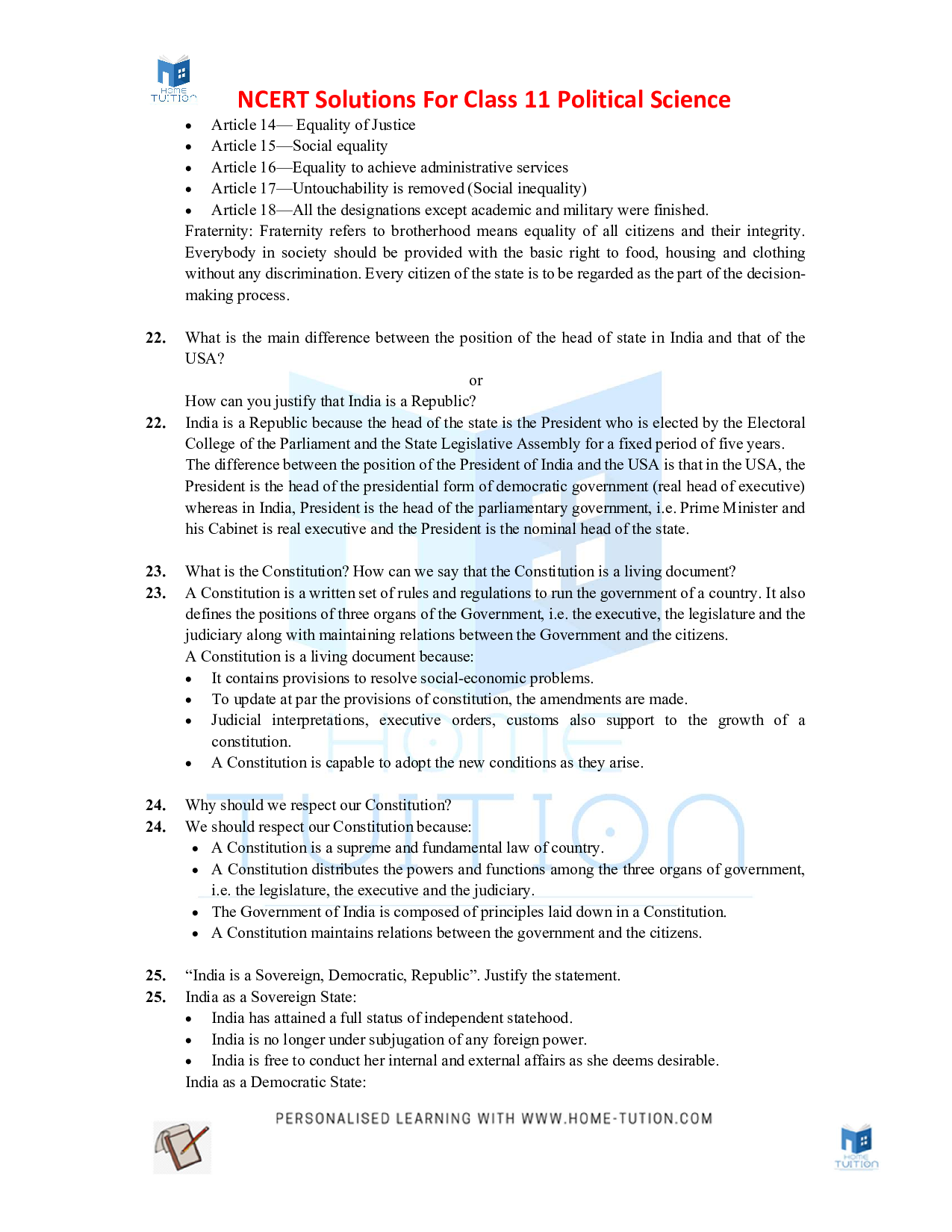
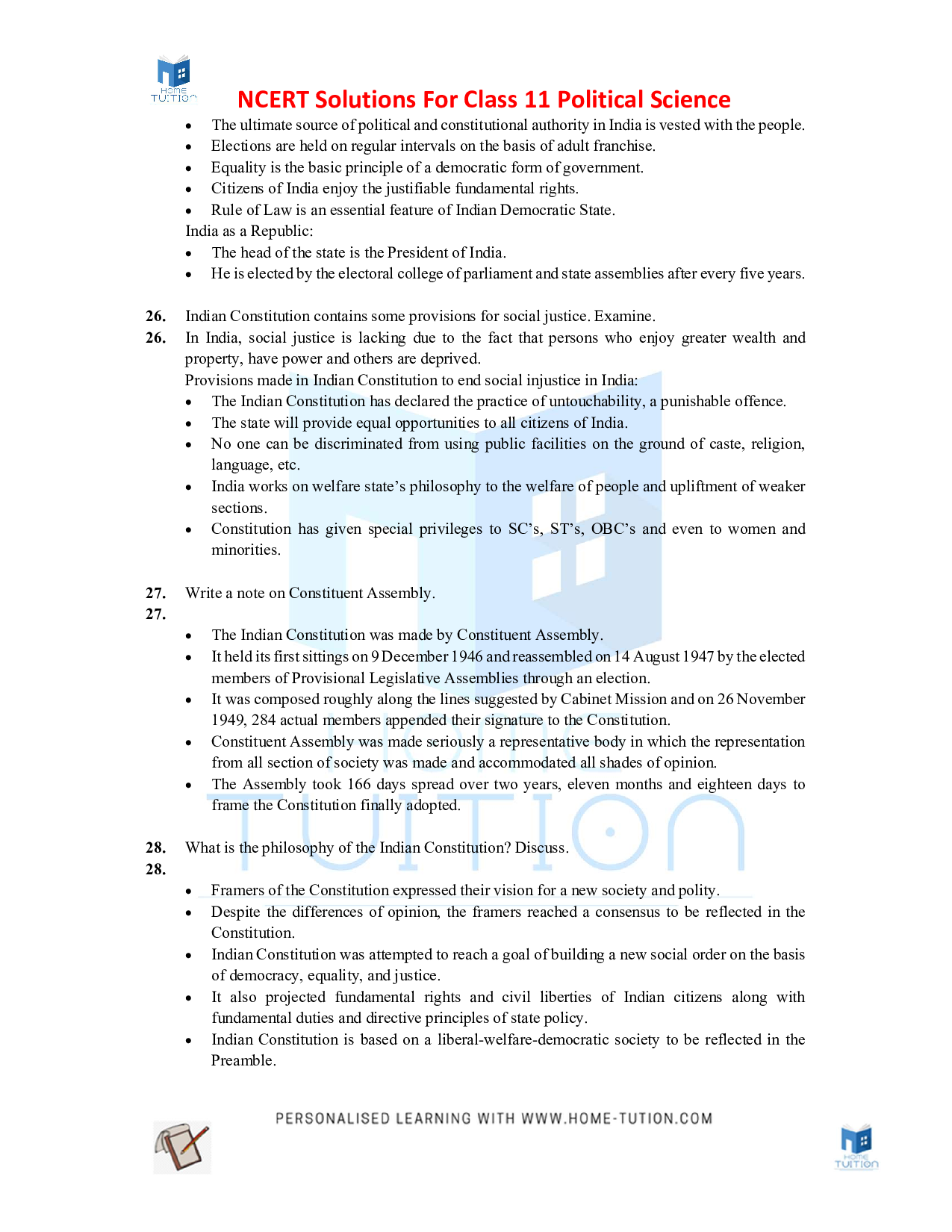
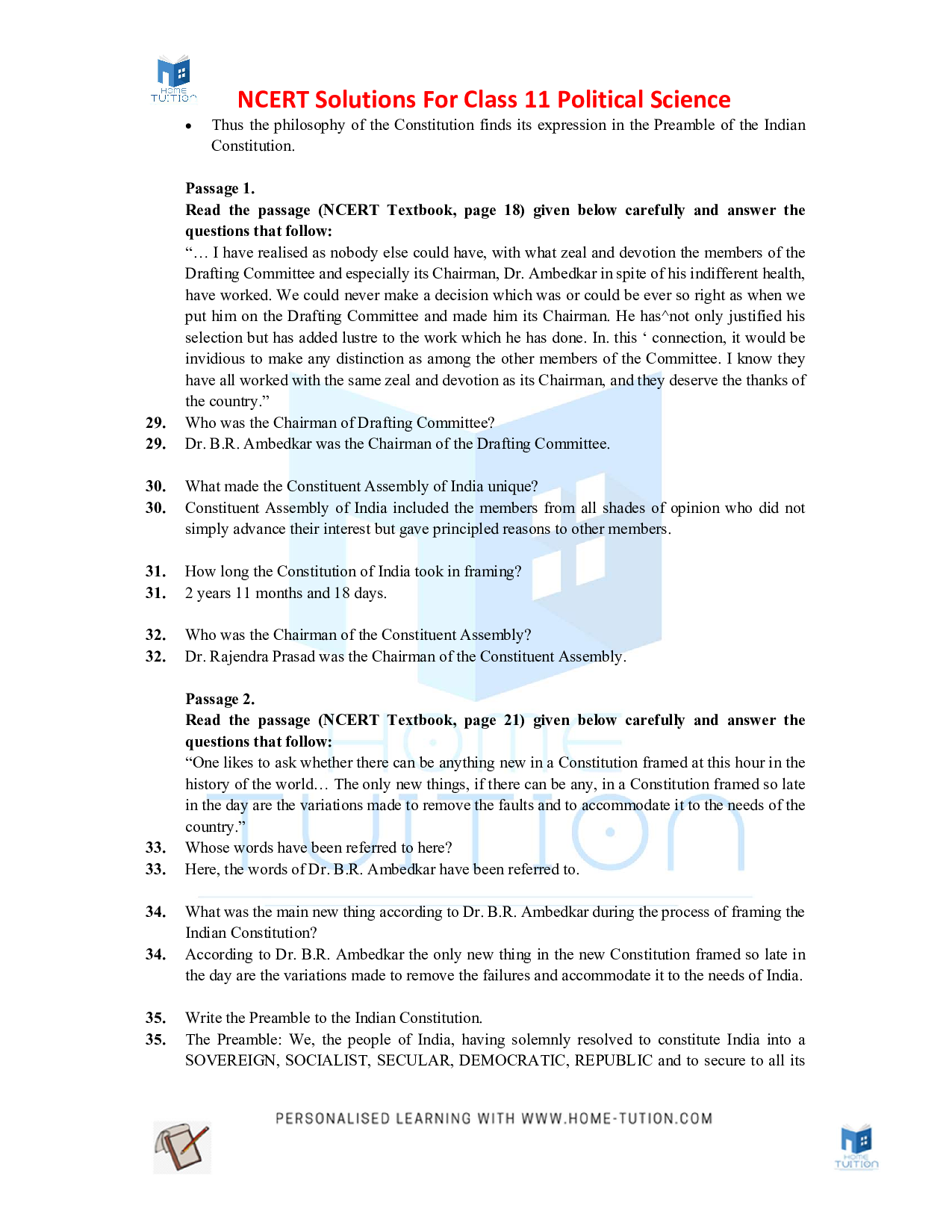
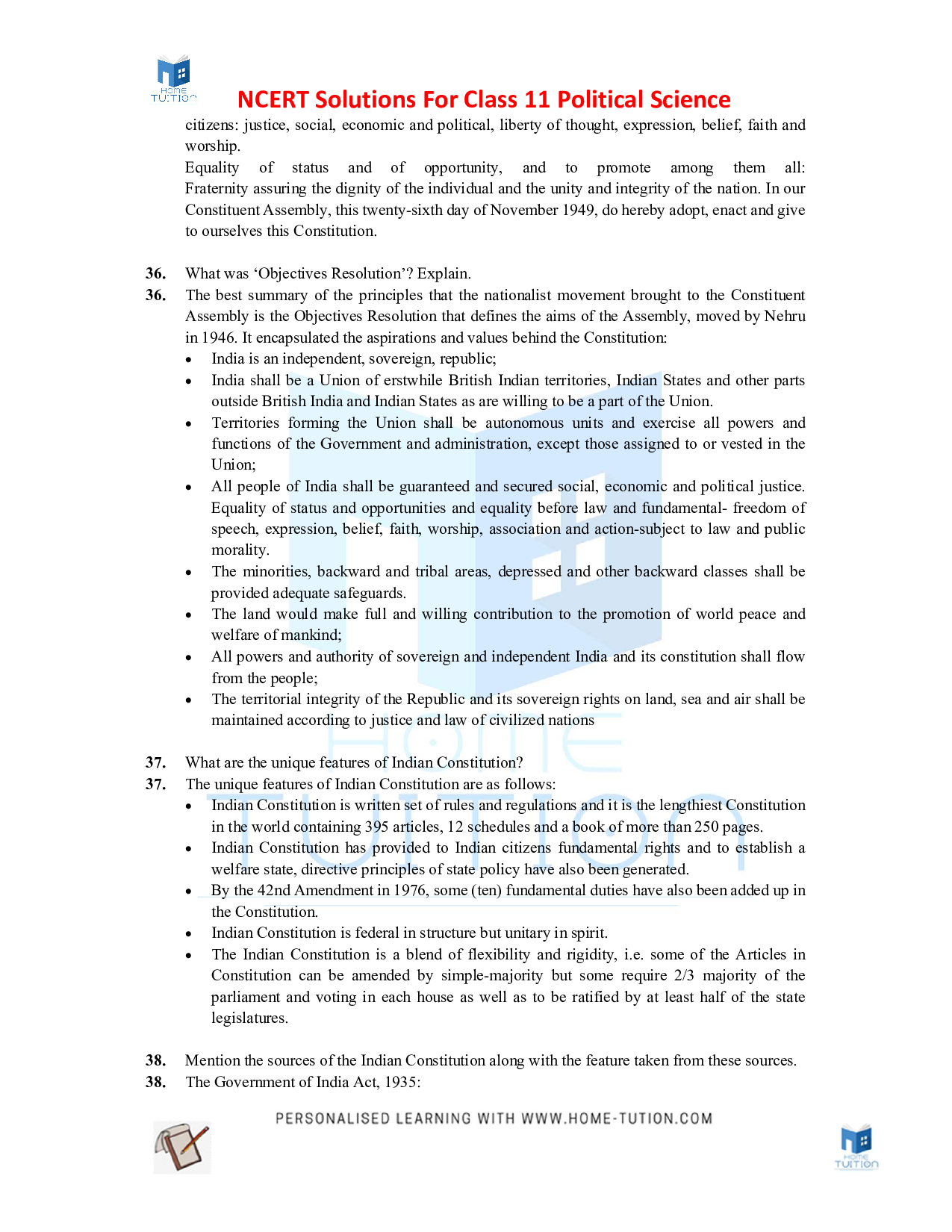
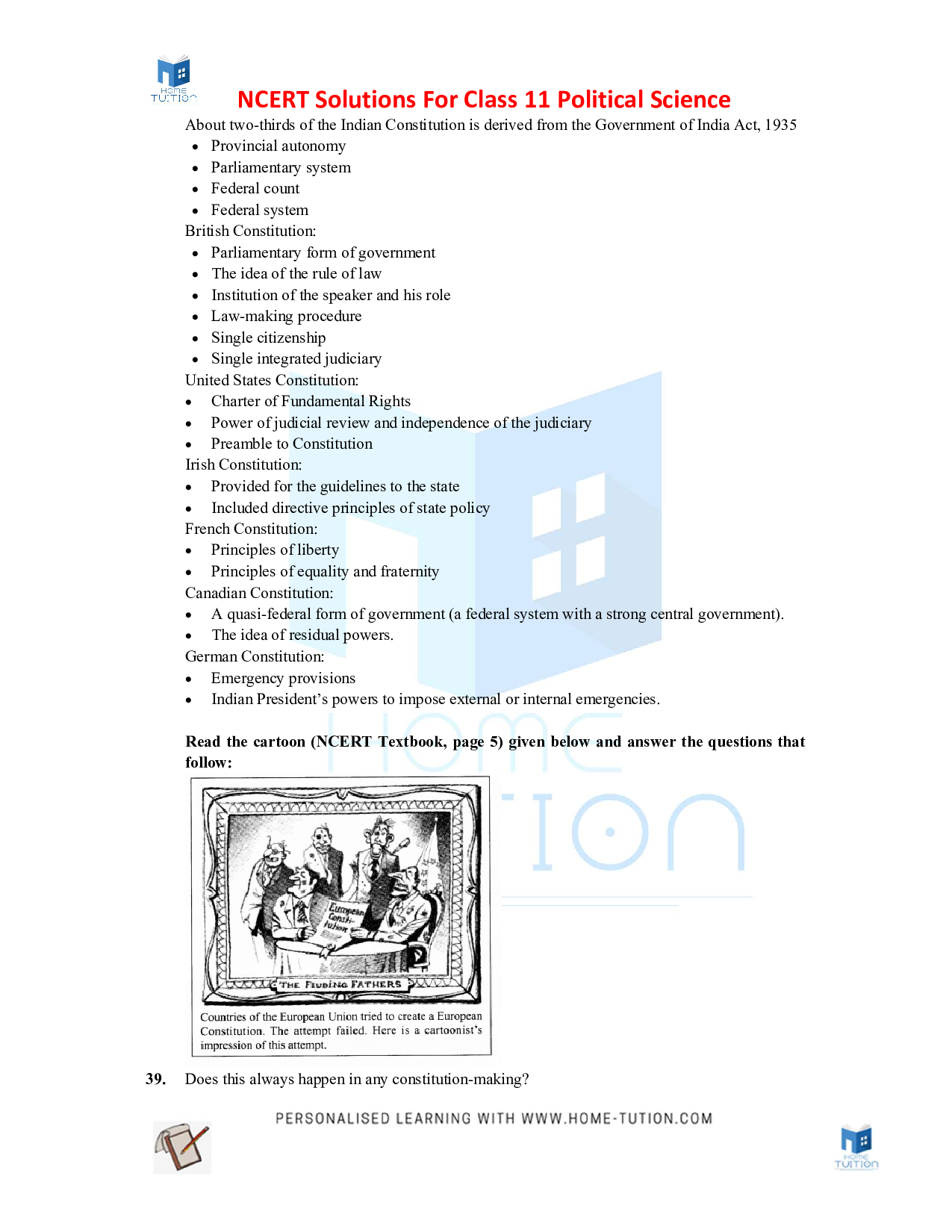
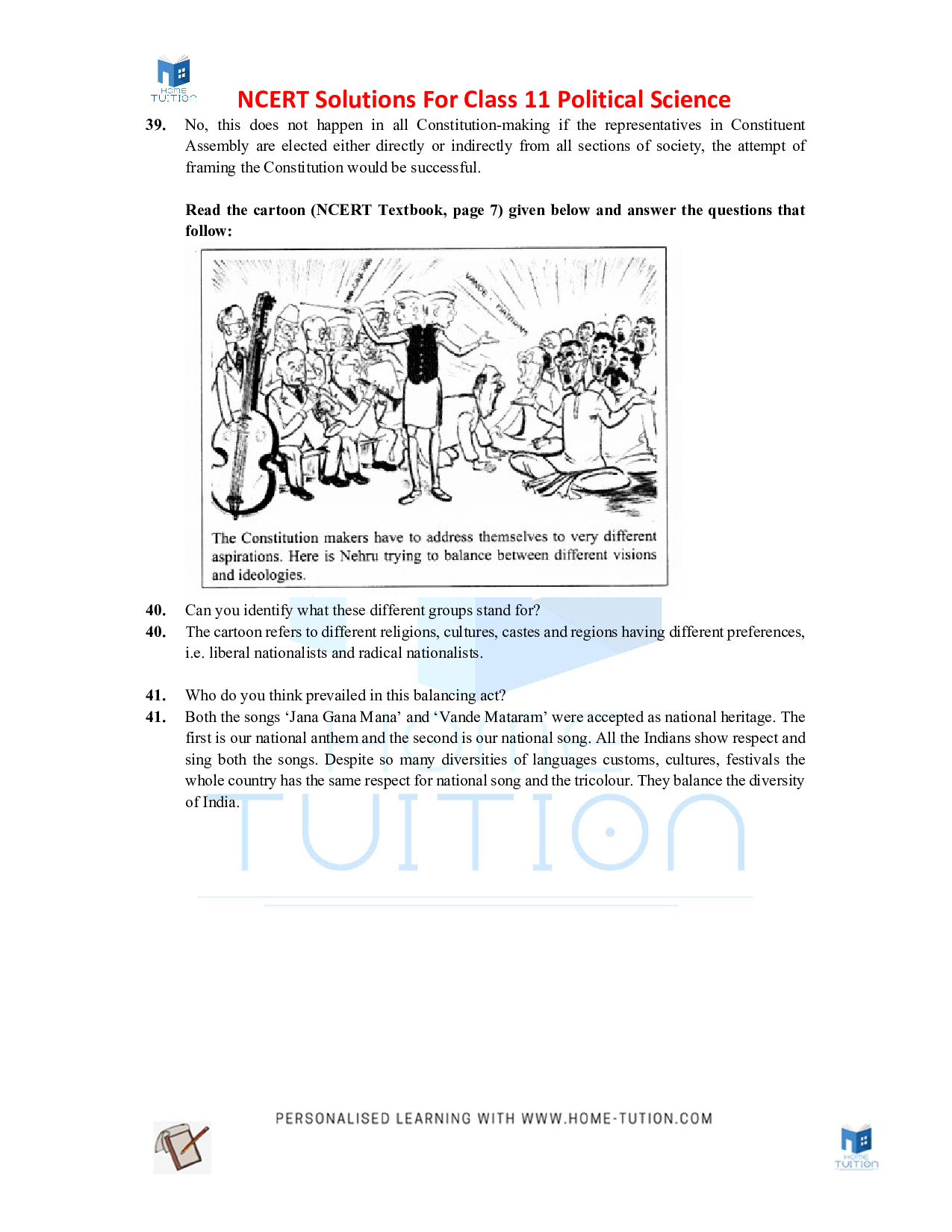
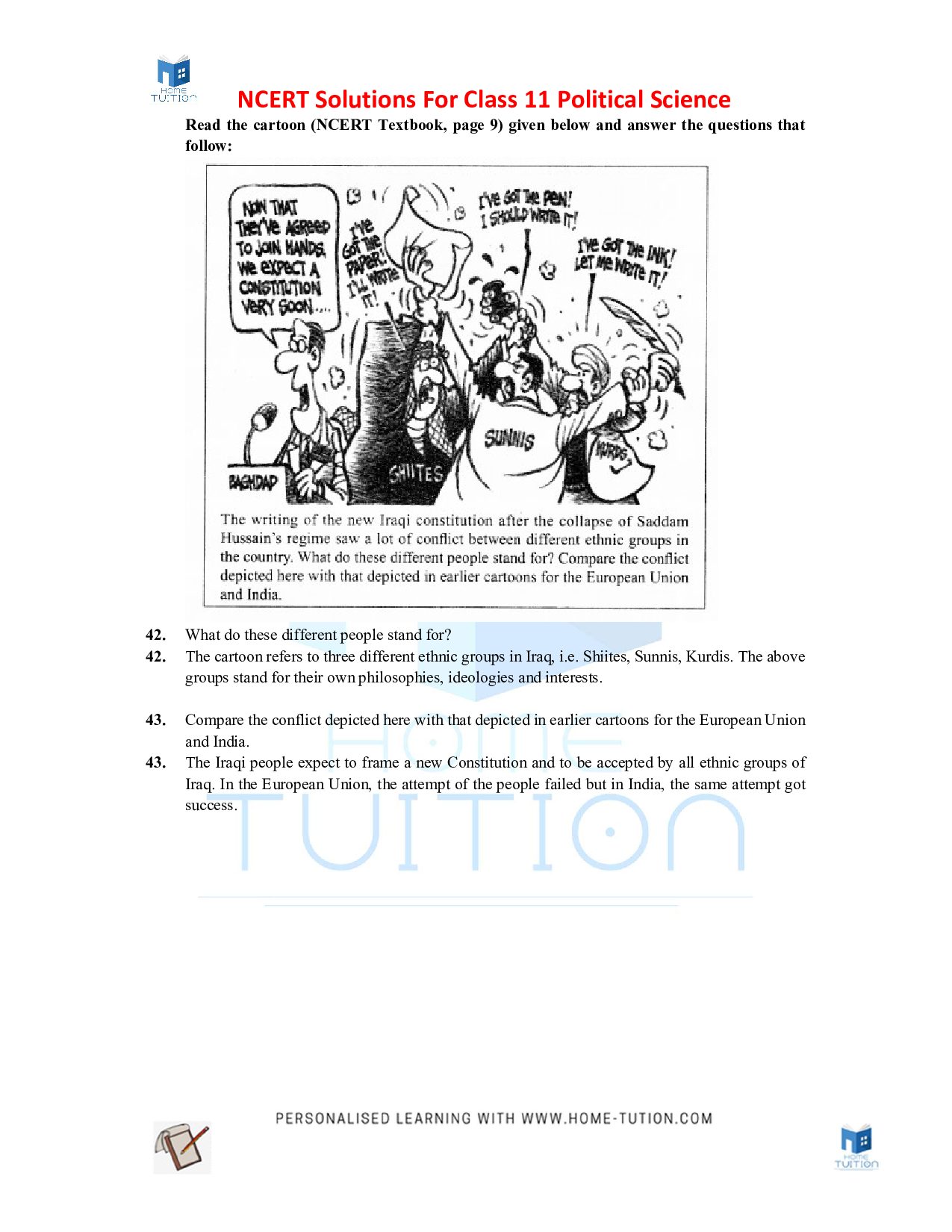
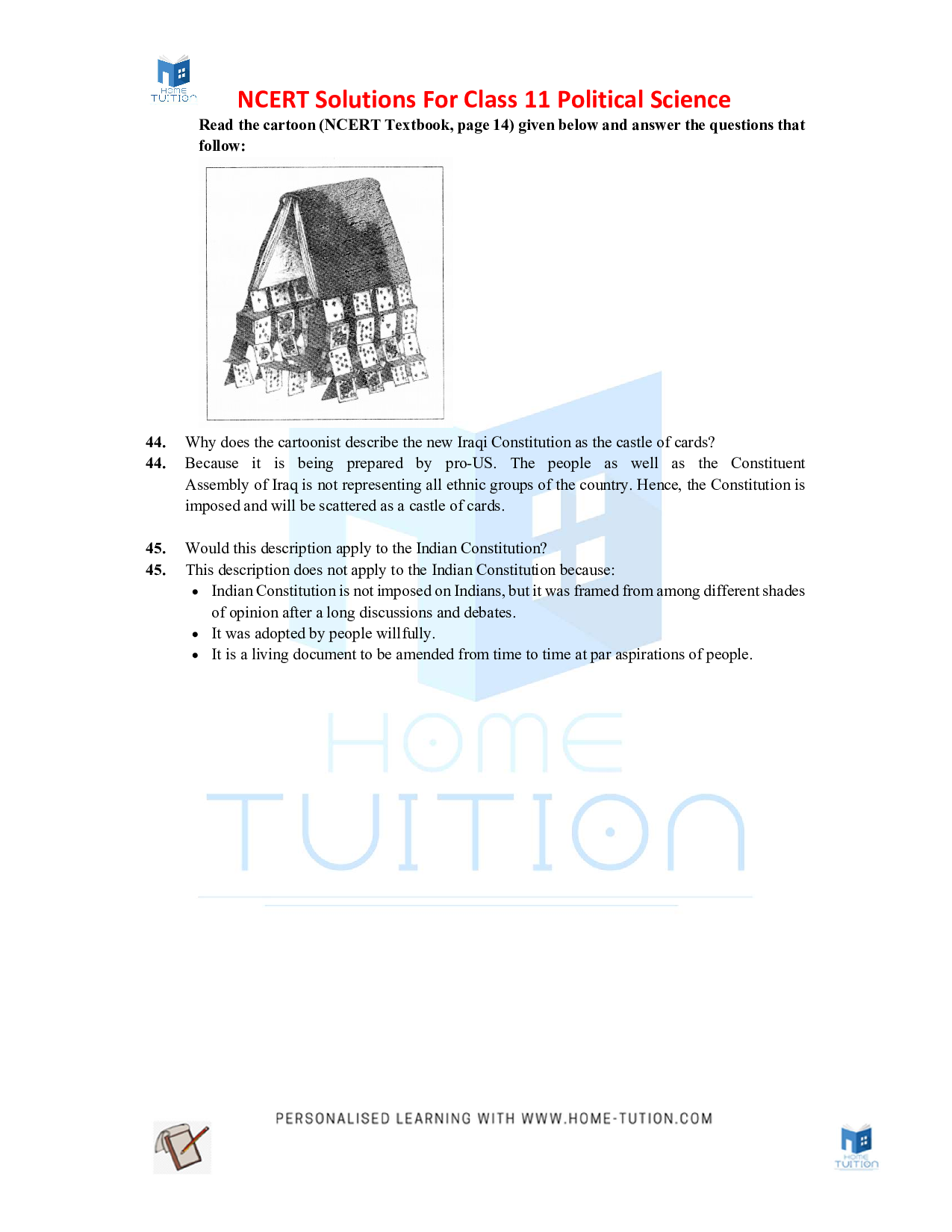
Related Links
- Chapter 1 Constitution - Why and How?
- Chapter 2 Rights and Duties in the Indian Constitution
- Chapter 3 Election and Representation
- Chapter 4 Executive
- Chapter 5 Legislature
- Chapter 6 Judiciary
- Chapter 7 Federalism
- Chapter 8 Local Governments
- Chapter 9 Constitution as a Living Document
- Chapter 10 The Philosophy of the Constitution